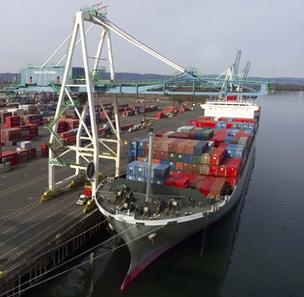forum
library
tutorial
contact

Port of Portland Plans to Subsidize Hanjin Shipping
and Other Cargo Carriers to Keep Them Calling
by Richard Read
The Oregonian, February 7, 2014
|
the film forum library tutorial contact |

|
Port of Portland Plans to Subsidize Hanjin Shipping
by Richard Read
|
 The Port of Portland plans to shell out as much as $4 million more to persuade Hanjin Shipping Co. and other ocean carriers to keep calling despite chronic labor problems and low productivity on the docks.
The Port of Portland plans to shell out as much as $4 million more to persuade Hanjin Shipping Co. and other ocean carriers to keep calling despite chronic labor problems and low productivity on the docks.
Port commissioners will vote Wednesday on an incentive plan in which Hanjin and other shipping lines would receive $20 per container moved through Portland up to a certain threshold. Carriers would get an added $25 payment for each increase in the number of containers they transported.
The incentive plan, coming as Hanjin managers decide any day now whether to continue weekly vessel calls on Portland, is the most generous package for shipping lines since labor disputes broke out in 2012.
"This is part of our concerted effort to keep Hanjin here," said Sebastian Degens, Port general manager of marine business development. "I'm optimistic that it will be successful."
Hundreds of Northwest exporters and importers depend on Hanjin to carry cargo to and from Asia. But the South Korean shipping line is mired in heavy global financial losses and seeking ways to cut costs. Hanjin managers may end calls on Portland or Seattle, or at one of two ports in British Columbia: Vancouver or Prince Rupert.
The incentive plan expected to be adopted Wednesday at the commissioners' monthly meeting doubles a $10-a-container carrot that the Port gave shipping lines last year, although that program was capped at $1 million. It's far larger than an initial $175,000 payout the Port made in 2012 to shipping lines, encouraging them to return after bypassing the city because of slowdowns from the labor disputes.
But the 2014 incentive package would give nothing to the Port's terminal operator, ICTSI Oregon Inc., which received $2.7 million in 2012 and $3.4 million in 2013. Those payments, essentially in the form of rental rebates, were attributed to losses stemming from disputes that the Port and ICTSI had with the International Longshore and Warehouse Union.
"Given the enormous significance of Hanjin being on the edge of its decision, we thought moving all of our incentive payment this time to the carriers would be the most meaningful way we could do the retention," Degens said.
Port officials said the incentive payments would be funded entirely from ICTSI's lease payments for the terminal. The Port is a public agency with commissioners appointed by the governor, but only a small fraction of its income derives from tax revenues.
Asked about the latest incentive plan, Jennifer Sargent, an ILWU spokeswoman, issued a statement Friday accusing ICTSI of badly managing the terminal and unfairly blaming longshore workers. She said ICTSI was blackmailing Portland's stakeholders for profits, presumably threatening to punish customers and others if they refused to accede to the terminal operator's demands.
"It's blackmailing the carriers in rate negotiations, blackmailing the shippers who fear losing container service and blackmailing the Port into subsidizing its mismanagement," Sargent wrote of ICTSI. "It's shameful that the Port is spending $7 for every man, woman and child in Portland to enable the mismanagement of ICTSI -- a corporation whose CEO, Enrique Razon, enjoys a personal wealth of $4.5 billion."
Sargent also released a letter that officials of ILWU Portland locals 8 and 40 sent Jan. 23 to an ICTSI manager. They wrote that freight was backing up at North Portland's Terminal 6 because of inoperable vehicles used to move containers. The implication was that equipment shortages, not labor slowdowns, were lowering productivity on the docks.
Responding to Sargent's comments, an ICTSI Oregon lawyer issued a statement later Friday saying, "We completely deny the ILWU's scurrilous attacks, which have no basis in reality." Elvis Ganda, ICTSI Oregon chief executive, declined to comment on the Port's proposed incentive plan. Neither addressed the allegation concerning equipment shortages.
Hanjin managers in Seoul have watched the situation closely in recent months as Gov. John Kitzhaber brokered a deal in which union electricians gave disputed jobs at the container terminal to longshore workers. Port officials say that if longshore workers improve productivity, they'll transfer authority over the jobs to ICTSI.
Mike Radak, Hanjin America Inc. chief operating officer in New Jersey, did not return phone calls Friday for comment on the Port's proposed incentive plan and his company's intentions. It's unclear to what extent Portland's parochial issues rate among concerns at South Korea's largest ocean cargo carrier, which faces considerable financial challenges. In November, Hanjin chief executive Kim Young Min resigned, taking responsibility for two successive years of losses and delays in getting financial support from creditors.
Hanjin is among cargo carriers facing global overcapacity and a slump in freight rates caused by China's weak iron-ore demand and other factors. It has more than $690 million in debts and loans maturing this year. In 2013, its shares fell from 12,800 won to 7,310 won on the Korea Stock Exchange.
A new CEO, Tai Soo Suk, is working to right the company. His management experience includes years at Korean Air, which is a major Hanjin Shipping shareholder. Port officials expect Hanjin's decision on Portland will be made at Hanjin's Seoul headquarters.
learn more on topics covered in the film
see the video
read the script
learn the songs
discussion forum
